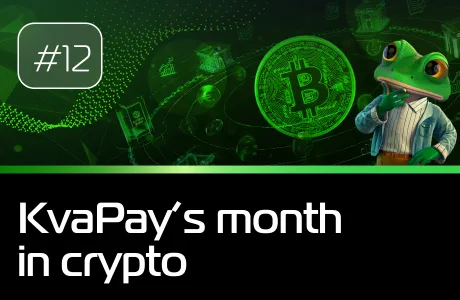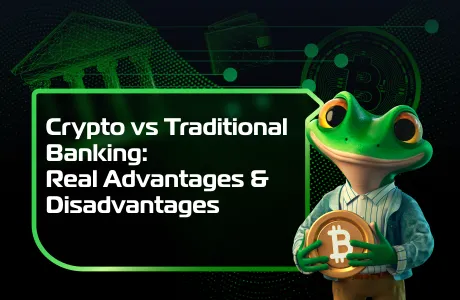
KvaPay Is Now MiCA Licensed: Choose a Regulated Way to Enter the Crypto World
-
 Read More
Read MoreWhat Banks Rarely Explain About Cryptocurrency Payments
Did you know that certain cryptocurrency solutions can process transactions as small as fractions of a cent? This capability does not apply to cryptocurrency payments as a whole, but rather to specific technologies such as layer-2 networks (e.g., the Lightning Network) or blockchains designed for high-volume, low-fee transactions (e.g., BSV).
-
 Read More
Read More#12 KvaPay’s month in crypto
In this KvaPay's month in crypto we will discuss: Stablecoins take center stage: From European Union banks uniting to launch a MiCA-compliant euro stablecoin, to the International Monetary Fund warning about fragmented global regulation, and Visa doubling down with a new stablecoin advisory practice. Bitcoin’s growing role in global finance: Elon Musk reframes Bitcoin as an energy-backed alternative to fiat, while Michael Saylor proposes Bitcoin-backed digital banking systems for nation-states. Altcoins rebound with real-world narratives: Regulatory clarity and utility drive renewed momentum for XRP, Zcash, and Algorand, highlighting privacy demand, institutional interest, and enterprise adoption in 2025
-
 Read More
Read MoreWhy Cryptocurrency Adoption in Emerging Markets Is Breaking All Records in 2025
We're witnessing a remarkable shift as cryptocurrencies in emerging markets gain momentum. Countries like El Salvador have already embraced Bitcoin as legal tender, while nations such as Argentina and Zimbabwe increasingly turn to cryptocurrencies to protect against inflation. As we look ahead, central banks representing one-fifth of the world's population are preparing to launch their own digital currencies, marking a new era in global financial accessibility.
-
 Read More
Read More#11 KvaPay’s month in crypto
In this KvaPay's month in crypto we will discuss: How the European Central Bank is sounding the alarm over the rapid rise of dollar-backed stablecoins and what that means for the euro’s future in the digital economy. With 99% of the $300 billion stablecoin market tied to the US dollar, officials fear losing monetary influence as Europeans increasingly opt for dollar-based digital assets. Meanwhile, euro-stablecoin issuers argue that a strong private euro-stablecoin ecosystem—not a slow-moving digital euro—is the key to countering U.S. dominance and securing the euro’s relevance in global crypto markets.
-
 Read More
Read MoreWhat Is a Crypto Gateway? Simple Solutions for Modern Business Payments
Blockchain technology now serves over 560 million people worldwide, and crypto gateway solutions are quickly changing how businesses handle payments. Cryptocurrency payments work around the clock and eliminate geographical restrictions that traditional banking systems face. Businesses can reach emerging markets by adding a crypto payment gateway to their websites. The system offers lower transaction costs and improved security against fraud.
-
 Read More
Read MoreCrypto Payment Guide: Easy Steps to Shop Online & In-Store
Did you know that major retailers like Starbucks, AMC Theaters, and AT&T now accept cryptocurrency payments? In fact, thousands of businesses worldwide are embracing crypto transactions, thanks to their lightning-fast confirmation times and enhanced security. Whether you're shopping online or in-store, cryptocurrency payments offer a direct peer-to-peer transfer system that bypasses traditional banking intermediaries.
-
 Read More
Read More#10 KvaPay’s month in crypto
As the crypto landscape evolves at fast speed, October proved to be a month of record-breaking developments, regulatory shifts, and institutional momentum. From the European Central Bank taking concrete steps toward a digital euro to the explosive growth of the stablecoin market, the sector continued to push boundaries despite market turbulence.
-
 Read More
Read MoreThe Truth About Crypto Payment Myths That Could Cost You Money
Contrary to popular crypto payment myths, only 0.34% of all cryptocurrency transactions in 2023 were linked to illicit activities. This means 99.66% of crypto payments are completely legitimate.
-
 Read More
Read More#9 KvaPay’s month in crypto
September brought a wave of developments reshaping the financial and crypto landscape across Europe and beyond. From new momentum in multicurrency stablecoins and bank-backed blockchain experiments to the delayed timeline for the digital euro and fresh moves by major institutions like Circle, Deutsche Börse, and top European banks, the stage is being set for a more diversified digital economy. At the same time, macroeconomic strains—like France’s soaring deficit—are fueling debates on Bitcoin’s role as a hedge against fiat instability.
-
 Read More
Read MoreCrypto vs Traditional Banking: Real Advantages & Disadvantages
With cryptocurrencies reaching a staggering €3.2 trillion in market capitalization, we're witnessing a defining moment in the battle between digital and traditional banking.
-
 Read More
Read More#8 KvaPay’s month in crypto
Every month we bring you the most essential updates from Europe’s crypto scene. From the ECB’s digital euro plans to corporate bitcoin adoption and retail payment breakthroughs.
-
 Read More
Read MoreUnderstanding 2FA: Comparing SMS, Authenticator Apps, and Hardware Keys
Two-factor authentication (2FA) remains one of the most effective ways to protect online accounts. Yet not all 2FA methods offer the same level of protection.
